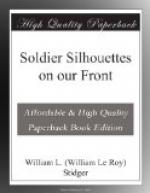It’s the old-time religion;
It’s the old-time religion;
It’s the old-time religion;
And it’s good enough
for me.
It was good for my old mother;
It was good for my old mother;
It was good for my old mother;
And it’s good enough
for me.”
Then much to my astonishment they did something that I have since learned is the very way that these songs grew from the beginning. They extemporized a verse for the day, and they did it on the spot. I made absolutely certain of that by careful investigation. They sang this extra verse:
“It was good for ole Abe Lincoln;
It was good for ole Abe Lincoln;
It was good for ole Abe Lincoln;
And it’s good enough
for me.”
“That first verse, ‘It is good for a world in trouble,’ is certainly a most appropriate one for these times in France,” I said aside to the secretary.
“Yes,” he replied; “if ever this pore ole worl’ needed the sustainin’ power of the religion of the Christ, it does now; an’ if ever this pore ole worl’ was in trouble, that time suttinly is right now,” he added with fervor.
And now I can never think of the world, nor of the folks back here at home, nor of the millions of our boys over there that I do not hear the sweet voices of that crowd of negroes singing reverently and fervently:
“It is good for a world in trouble;
It is good for a world in trouble;
It is good for a world in trouble;
And it’s good enough
for me.”
Another Silhouette of Song that stands out against the background of memory is that of a hymn that I heard in Doctor Charles Jefferson’s church just before I sailed for France. I was lonely. I walked into that great city church a stranger, as thousands of boys who have sailed from New York have done. I never remember to have been so unutterably lonely and homesick. It was cold in the city, and I was alone. I turned to a church. Thousands of boys have done the same, may the mothers and fathers of America know, and they have found comfort. If the parents of this great nation could know how well their boys are guarded and cared for in New York City before they sail, they would have a feeling of comfort.
I sat down in this great church. I was thinking more of other Sabbath mornings at home, with my wife and baby, than anything else. A hymn was announced. I stood up mechanically, but there was no song in my throat. There was a great lump of loneliness only. But suddenly I listened to the words they were singing. Had they selected that hymn just for me? It seemed so. It so answered the loneliness in my heart with comfort and quiet. That great congregation was singing:
“Peace, perfect peace;
With loved ones far away;
In Jesus’ keeping, we are safe;
and they.”
A great sense of peace settled over my heart, and I have quoted that old hymn all over France to the boys, and they have been comforted. Many a boy has asked me to write him a copy of that verse to stick in his note-book. It seemed to give a sense of comfort to the lads, for their loved ones, too, were “far away,” and since I have come home I find that this, too, comes as a great comfort hymn to those who are here lonely for their boys “over there.”




